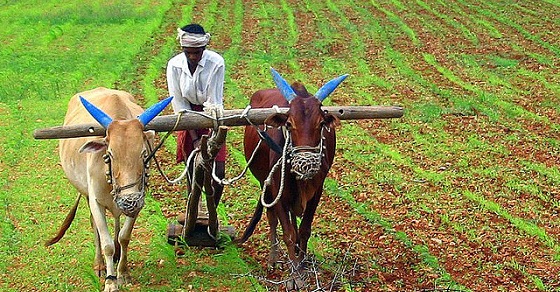Posted by Brian Blowings | April 18, 2014
Monsanto Subsidiary’s GMO Cotton Banned in Indian State After Crop Failure and Massive Losses
The genetically modified cotton, Monsanto’s proprietary Bt strain, has now been officially banned in the Indian state of Karnataka. The cotton, accounting for up to 90% of the US market, has apparently failed to deliver on the promise of higher yields and pest resistance in India. These Bt Cotton seeds are being pushed by Monsanto’s Indian Subsidiary Maharashtra Hybrid Seeds Company (Mahyco). Image credit: antkriz
“Usually private companies offer compensation and the government lets them off the hook, but the state government has decided to act tough on Mahyco,” a source told Bangalore Mirror. “Farmers have suffered massive losses as the crops have failed despite the company making tall advertisements about the superiority of its genetically-modified seeds.”
Despite the hype over these GMO crops that were supposed to give a big boost to the Indian cotton industry, they have proven to be a massive failure-accounting for 133,000 acres of failed fields costing farmers upwards of $40 million in loses-in the state of Karnataka alone.
Sources say Mahyco had claimed that Bt cotton crops would be pest resistant. “But this has been proved wrong,” the source said. “Not only were the crops attacked by pests, but in most areas the plants failed to produce cotton bolls. This had led to an uproar in the farming community. Farmers wanted the company to be blacklisted.”
Many scientists believe the effectiveness of Bt crops have long passed, as pests that were supposed to be resistant to the Bt crops’ internal pesticides have evolved to become resistant, effectively creating superbugs. This leads to increases in the use of pesticides, another promise that has been broken by Monsanto and Co, resulting in just as much if not more health inflicting pesticides entering the ecosystem and water supply.
India is familiar with the failure of GMO crops. Hundreds of thousands of farmers have literally committed suicide after investing their life savings into crops that were doomed to fail, resorting to drinking the very pesticides they were supposed to use on their crops to kill themselves.
While we know that Monsanto’s business plan hinges on basically becoming part of governments worldwide to circumvent the regulatory process, we also wonder when will they finally be held accountable. The public at large has rejected Monsanto and their damaging policies and products, but influential characters within major governments continue to shield them from any liability and regulation.
If you think what Monsanto is doing is wrong, then join the world wide March Against Monsanto on May 24th.
This article may be republished freely under a Creative Commons license with attribution to WeSuppotOrganic.com

